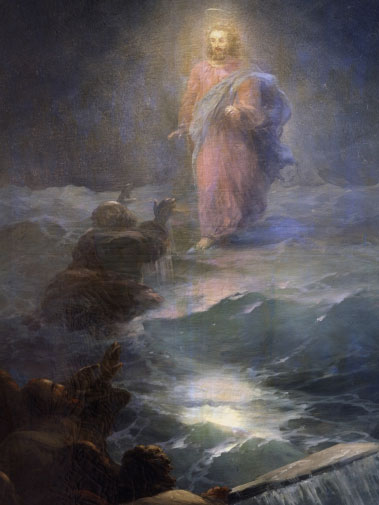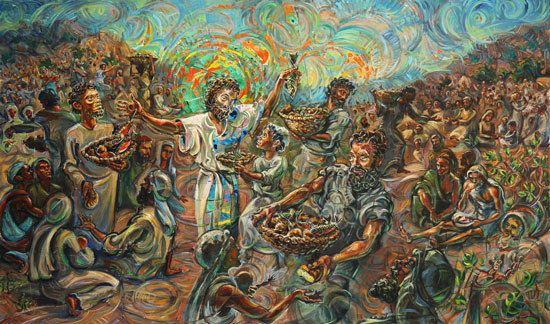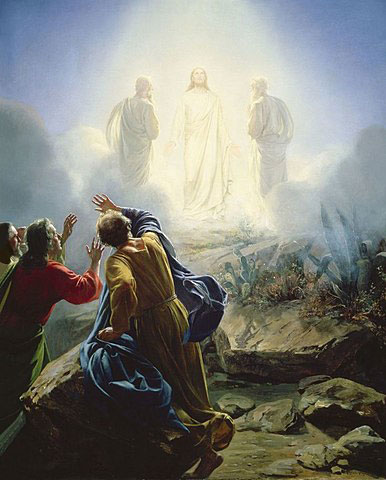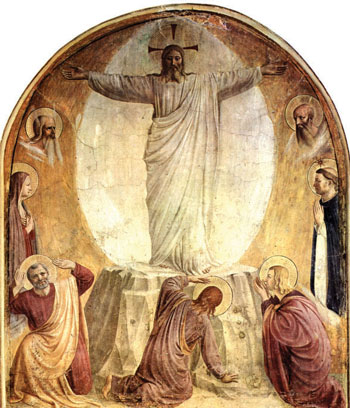I.Theme – God works through us in difficult times

"The Parable of the Mustard Seed" – James Patterson
The lectionary readings are here or individually:
Old Testament – 1 Kings 3:5-12
Psalm – Psalm 119:129-136 Page 774, BCP
Epistle –Romans 8:26-39
Gospel – Matthew 13:31-33,44-52
Our readings this week reflect God’s love for His people. They show how God works through our difficult times and will often bless us through them. He works through and within our times of weakness and works for the good of all who love Him. Secondarily, the readings cover the topics of good and evil and discerning between them.
The Old Testament reading recounts Solomon’s prayer – “Solomon’s prayer – “Give your servant therefore an understanding mind to govern your people, able to discern between good and evil; for who can govern this your great people?” It is the perfect prayer modest, recalling past blessings and confessing our ignorance. The value of discernment is praised, the capacity to see issues, recognize temptations, and know what is right and wrong, based on divine truths.
This leads naturally into the Psalm, which immediately counters any notion that you have to be a king (or a Solomon, for that matter) to discern what is right: “The unfolding of your words gives light; it imparts understanding to the simple.” Anyone who pays attention can discern the decrees of God, for it is God who is our teacher. The Word of God is a means of grace. Through the Word–which is both law and gospel–the Lord of Israel encounters the people of God..
Paul in Romans examines in detail how certain can we be that God will complete the execution of his plan of salvation. This is Christian life lived in the Spirit. Nearly every sentence is a new way of stating the promise that God has not abandoned "us," and is working on our behalf. The Spirit meets with her own intercessions and prayers – aiding our inability to pray. What is even more amazing is that God still loves us even after countless incidents of outrageous human behavior, pride and disloyalty. The Spirit helps us to resist the powers that would defeat us and separate us from God
Today’s gospel, Matthew concludes a long series of parables about the reign of God. There are 5 parables in these verses. These parables encourage us to live the kingdom into being in every aspect of our lives. It addresses basic questions: "What is it ? How do we find it? What’s it like? What do I have to do to enter it?" In telling these parables, Jesus did not make the characters angels or kings, but a woman, a merchant, fishermen. And he did not use difficult or out-of-reach tasks, but everyday peasant-class things like baking bread and fishing. The kingdom is here but it’s modest. It’s hidden. It’s quiet. In fact, those who discover the kingdom sometimes tend to stumble upon it almost by accident. The kingdom is a great treasure but it may not reveal itself immediately
Summing them up, Jesus praises those who have listened carefully and understood. This praise of the wise in today’s gospel seems to justify this choice of first reading Solomon’s request for wisdom.
II. Summary
Old Testament – 1 Kings 3:5-12
The Hebrew Scriptures tell of a long-repeated cycle of virtue and decline, punishment, repentance, and forgiveness. The cycle applies to the people, to their priests and their kings.
This is the story of a high point in the life of Judah’s third king, Solomon. This reading deals with a spiritual high point in the life of King Solomon, but other chapters predictably tell of his sins.
Solomon prays to God for one gift: the gift of wisdom. “Give your servant therefore an understanding mind to govern your people, able to discern between good and evil; for who can govern this your great people?”
God, pleased with Solomon’s values, grants him not only wisdom but riches and long life as well.
God’s response – “God said to him, "Because you have asked this, and have not asked for yourself long life or riches, or for the life of your enemies, but have asked for yourself understanding to discern what is right, I now do according to your word. Indeed I give you a wise and discerning mind; no one like you has been before you and no one like you shall arise after you.”
A happy ending, if the story ended there, but it does not.
Solomon’s reign did not end in the wisdom it began. The foreign wives he married led him into permitting idolatry, sanctioned by the royal household. To build the temple, he laid heavy burdens of taxation on God’s people. The resentment his policies fostered during his life erupted shortly after his death in the schism that divided God’s people into two kingdoms forever. Only two tribes remained loyal to Solomon’s son after Solomon’s death.
Lessons
1. Imperfect People Need To Pray. “Solomon loved the Lord, walking in the statutes of David his father, only he sacrificed and made offerings at the high places,” (v.3). The “high places” were locations where idolatry was practiced. This is evidence of his imperfection. Good intentions were not fully carried out, thus he was imperfect in his efforts
It may be argued, in fact, the more we struggle; the less perfect we are, the more we need to speak to God and ask for His help and make good commitments to Him. Here is a man with enough love for the Lord to respond to God and make requests in prayer, at least at this point in his life
2. We need to be modest in our prayers. A basic wish, nothing extravagant. Solomon had enough love for the Lord to know what he needed. He needed to receive wisdom from the highest source He wasn’t perfect before God, but humble before God to ask for something valuable, not temporal. We need this humble sense of our weakness and need. And we need to take those weaknesses and needs to the Lord in sincere prayer. While we are not assigned the leadership of a nation, the navigation of our personal lives requires wisdom and discretion.
3. Always Acknowledge Past Blessings Received In Your Family. In Solomon’s prayer, he acknowledged past blessings received: “You have shown great and steadfast love to your servant David my father, because he walked before you in faithfulness, in righteousness, and in uprightness of heart toward you.
First, he speaks of himself using the very same term he used for David: both he and his father are "your (God’s) servant" (verses 6a, 7a). Next, Solomon calls himself "only a little child" lacking knowledge, perhaps even commonsense. In light of 1 Kings 11:42 and 14:21, these last details are not to be taken flat-footedly
4. Always Confess Your Ignorance (v.7). The new king said, “I do not know how to go out or come in.” It was like someone today saying, “I don’t know if I’m going or coming.” Such humble confessions of ignorance ought to be stated to God, when we ask for His help. We ought to be willing to say to the Father: “I don’t know what to do, but I know You do. Help me learn and grow and do right.”
5. The Value Of Discernment. “…that I may discern between good and evil,” (v.9). No matter where you are in history, geography, culture, or position – you need this skill: Discernment. It is the capacity to see issues, recognize temptations, and know what is right and wrong, based on divine truth.
6. Governing Others Requires Discernment. “…for who is able to govern this your great people?” (v.9). Our influence on others is directly related to our capacity to see what is right and wrong. While we are not charged to lead a nation, we are charged to let our lights shine and exert a good influence on others. That serious charge cannot be well done if we are unclear about right and wrong.
Psalm – Psalm 119:129-136 Page 774, BCP
Psalm 119 is the longest reading of the psalter made up of 176 verses are divided into 22 stanzas. Each stanza is precisely eight verses long. Each verse is made up of a letter from the Hebrew alphabet.
In general, the psalm is a wisdom psalm, but has elements of aspects of both praise and lament. Its main point is praise of the Law (Torah), and throughout the psalm there are repeated synonyms for the Law – “decrees”, “word”, and “commandments.”
It can be divided into 3 parts:
1. Verses 129-131 Wisdom-like statements about God’s Word: "Your decrees are wonderful. . ."
The Word of God is a means of grace. Through the Word–which is both law and gospel–the Lord of Israel encounters the people of God. The word is "wonderful”. In other words, just as God’s might acts of deliverance can be means through which God shows grace to suffering people, so also the Word itself is such a means that mediates God’s wonders to his people. The psalm then compares God’s word to light that gives guidance (the image here is one in which a scroll is unrolled and light shines upward and outward).
2 Verses 132-135 Petitions: "Turn to me… Keep my steps steady… Redeem me from oppression"
This builds on the promises of verses 129-131, by essentially asking that the Lord make real for the psalmist that which has been promised in the word. The psalmist prays for relationship guidance rescue and blessing
3. Verse 136 Wisdom-like statement: "My eyes [cry] because your law is not kept."
Far from being a self-righteous statement, this closing verse should be understood in a communal and personal way. The psalmist sheds tears both because his or her own community does not keep the word, but also because he or she is aware that personally, he or she fails to keep the commandments
The psalm, which immediately counters any notion that you have to be a king (or a Solomon, for that matter) to discern what is right: “The unfolding of your words gives light; it imparts understanding to the simple.” Anyone who pays attention can discern the decrees of God, for it is God who is our teacher.
Epistle – Romans 8:26-39
Paul has written of the new way of being we attain in baptism: we are freed of compounding sin leading to the finality of death and begin living in and with the Spirit, thanks to God’s gift of love. In this new life, we will live in complete accord with God, but now we still fail to live up to his (and our) expectations. We need help – help which the Spirit provides. In our present condition we have hope of attaining perfect union with God.
He now examines in detail how certain can we be that God will complete the execution of his plan of salvation. This is Christian life lived in the Spirit. Nearly every sentence is a new way of stating the promise that God has not abandoned "us," and is working on our behalf.
“We know that all things work together for good for those who love God, who are called according to his purpose. “
The "all things" in verse 28 is not referring to all the accidents and tragedies of life. That is how this statement is sometimes misused, and if someone falls and breaks a leg, there must be some good purpose for it.
The "all things" of this statement has reference in the context to all the things God has done for us; things such as the incarnation of His Son, the death, burial and resurrection of Christ, His ascension and His role as our intercessor and His intention to come again
This reading has two powerful sections that continue to speak to the human condition and the life in Christ.
The first is the notion of the weakness of our prayer. Often our weakness makes it ineffective and a collection of intelligible thoughts. Thus the Spirit meets with her own intercessions and prayers – aiding our inability to pray.
What is even more amazing is that God still loves us even after countless incidents of outrageous human behavior, pride and disloyalty. God knew beforehand that there would be a people with hearts receptive to the gospel of redemption. Based upon this foreknowledge God appointed beforehand what would be the ultimate destiny of this group. This group is made up of people who are willing to answer God’s call in Jesus Christ and come to Him
What, he asks, “are we to say about these things” (v. 31). God is so “for us” (v. 31) that he gave us his very Son, so he will surely follow through with the rest of his plan. God has passed a favorable sentence on us (“justifies”, v. 33) so who is there to accuse us of anything?
One of the things God appointed beforehand for this group is that each of them "become conformed to the image of His Son" (vs. 29). Paul Earnheart once noted a "progression" of salvation in these verses which I think is very helpful. First, there was man in the mind of God; then man is created. Also, man was recreated in God’s mind; then man is recreated by the power of the gospel. Finally, man was glorified in the mind of God; and man’s ultimate destiny is glory in eternity.
God gave up Son for our behalf -> God justifies -> Christ intercedes for us
The second is Paul’s recognition that the forces of this world (angels, rulers, things present, things to come, powers, heights, depths…) are powerless when confronted by this same Spirit, who not only helps us to pray, but helps us to resist the powers that would defeat us and separate us from God.
We have Christ, in his place of power and authority (“at the right hand of God”, v. 34) pleading for us. No hardship can separate the true Christian from Christ’s love for us (v. 35). Psalm 44:22 foretold the sufferings of Christians (v. 36); in them we are winning a resounding victory (“more than conquerors”, v. 37). Whether dead or alive at the Last Day, nothing – whether spiritual powers (“angels … rulers … powers”, v. 38) or astrological powers (commonly believed to control human destiny, “height, nor depth”, v. 39) or anything else – can separate us from God’s love – and defeat God’s purpose for us.
Gospel – Matthew 13:31-33,44-52
5 parables in 10 verses – a record!
These parables encourage us to live the kingdom into being in every aspect of our lives. It addresses basic questions: "What is it ? How do we find it? What’s it like? What do I have to do to enter it?"
You can get it initially in your head but you have to get it inside you in what you feel and something you known” And you see God is in the here and now; in the process view, dynamically present in every moment of existence, prompting us to be the seed, leaven the bread, buy the field, buy the pearl, sort the fish.
In telling these parables, Jesus did not make the characters angels or kings, but a woman, a merchant, fishermen. And he did not use difficult or out-of-reach tasks, but everyday peasant-class things like baking bread and fishing. The middle and landed classes are included in the purchase of the field and the pearl. The message is clear: we’re the ones who can make it happen. We’re the ones who can realize, even if only for fleeting moments, the kingdom of God on Earth.
We also know that this new thing we are experiencing is not one among many. It is not one value that pops up in the midst of other, equal values. It is a value that places all other values in relation to itself while it takes on primary importance, as with the treasure in the field or the pearl. It infects everything we do, as with leaven. It lives hospitably with other creatures, as with the mustard tree. It discerns right from wrong, as with the fish of every kind.
The kingdom is here but it’s modest. It’s hidden. It’s quiet. In fact, those who discover the kingdom sometimes tend to stumble upon it almost by accident. The kingdom is a great treasure but it may not reveal itself immediately
Unlike the sower parable of two weeks ago, none of this Sunday’s material appears in any of the other Gospels. Matthew places these parables after Jesus has left the crowds and gone into the house (13:36); they are for the disciples’ ears only.
Each begins in a similar manner: “The kingdom of Heaven is like.…”
The first two parables deal with the on-coming Reign of Heaven, and Jesus models it small A small mustard seed, and a small ration of meal – both grow into comparatively larger things. From small things grows the Kingdom of God, and this is the lesson that Jesus wishes to teach here. The search is for a meaning beyond the small – a mustard seed, yeast
1. Mustard Seed – The Mustard Seed originated with Jesus because the proverbially small mustard seed is a surprising metaphor for the kingdom. in Matthew and Luke, the shrub (plant) has actually become a tree, probably under the influence of Ezekiel 17:22-23 — the great cedar representing Israel. In the hands of Jesus, the Mustard Seed is a parody of the noble cedar
God’s Kingdom will grow from small beginnings to significant size. Like yeast, Jesus’ message will pervade the lives of many, transforming them
2. Parable of leaven
Jesus uses this story as an object lesson to illustrate the kingdom of heaven. A woman takes yeast (leaven) and mixes it into dough. Eventually, the whole of the dough is leavened.
In the Parable of the Leaven, we learn several things about the working of the kingdom in our present age. Each of these lessons stems from the nature of yeast.
First, the kingdom of God may have small beginnings, but it will increase. Yeast is microscopic in size, and only a little is kneaded into the dough. Yet, given time, the yeast will spread through all the dough. In the same way, Jesus’ domain started with twelve men in an obscure corner of Galilee, but it has spread throughout the world. The gospel makes progress.
Second, the kingdom of God exerts its influence from within, not from without. Yeast makes dough rise from within. God first changes the heart of a person, and that internal change has external manifestations. The gospel influence in a culture works the same way: Christians within a culture act as agents of change, slowly transforming that culture from within.
Third, the effect of the kingdom of God will be comprehensive. Just as yeast works until the dough has completely risen, the ultimate benefit of the kingdom of God will be worldwide . “The earth will be filled with the knowledge of the glory of the LORD, as the waters cover the sea” (Habakkuk 2:14).
Fourth, although the kingdom of God works invisibly, its effect is evident to all. Yeast does its job slowly, secretly and silently, but no one can deny its effect on bread. The same is true of the work of grace in our hearts.
The nature of yeast is to grow and to change whatever it contacts. When we accept Christ, His grace grows in our hearts and changes us from the inside out. As the gospel transforms lives, it exerts a pervasive influence in the world at large.
The second set of parables show a positive aspect to avarice. The one who discovers the treasure, doesn’t own the field in which it is discovered. So he, like the merchant who finds the pearl, sells all to obtain the treasure/pearl. This is about investing in the future kingdom, and the good that it will bring. Here the message is addressed to an individual (merchant, and the purchaser of the field). At some point, Jesus says, each of us will need to take the risk.
3. Hidden Treasure – The third image that Jesus gives us is that finding the kingdom of Heaven is like finding a treasure hidden in a field, for the sake of which one will sell everything. Treasure was often hidden in fields.
We note that this parable presupposes that the kingdom is hidden, that it is not yet revealed to everyone but it is close at hand. This fits well with the thrust of the rest of the chapter. The Kingdom of God is breaking forth and not everyone either sees it or is able to live within it yet . It is completely hidden and meaningless until God Himself reveals the meaning. He had found the righteousness of God which came to him by faith, quite apart from works and human worthiness. In his curiosity merely to see Jesus, Jesus found him.
4. Pearl of Great Price – Unlike the previous parable though we are challenged to ask the question: why does a merchant purchase a pearl? Merchants purchase items to resell them. So we have a spin on the hidden treasure. The hidden treasure is for the pleasure of the finder. The pearl’s pleasure is in its sale. We might say that the pearl becomes symbolically connected with the Gospel itself and the discipleship of giving away the grace received
Finally, the last parable about the net has some similarity to last Sunday’s parable about the darnel. Here again, both good and bad are the result of the Christian community’s effort. The reign (the catch of “everything”) will be useful, and at the end of time it will all be sorted out. The final statement about the scribe bringing out both old and new describes the Gospel as a continuation and fulfillment of the Torah.
5. Net – Perhaps like the wheat and the weeds we are being reminded once again that in the end the wicked and the righteous will be separated out. . On the Sea of Galilee, a “net” (v. 47) gathered all fish, only some of which were edible. At the end of the age, God will come to judge people, declaring the good to be his and discarding the others. Our job is to work and proclaiming the Gospel that we are encircling and bringing in such a bounty. Are we strong enough to live as saints and sinners, as sinners and saints, shoulder to shoulder with a diverse community ? This parable challenges us to be a church in mission
III. Articles for this week in WorkingPreacher:
First Reading – 1 Kings 3:5-12
Psalm – Psalm 119:129-136
Epistle – Romans 8:26-39
Gospel – Matthew 13:31-33, 44-52











